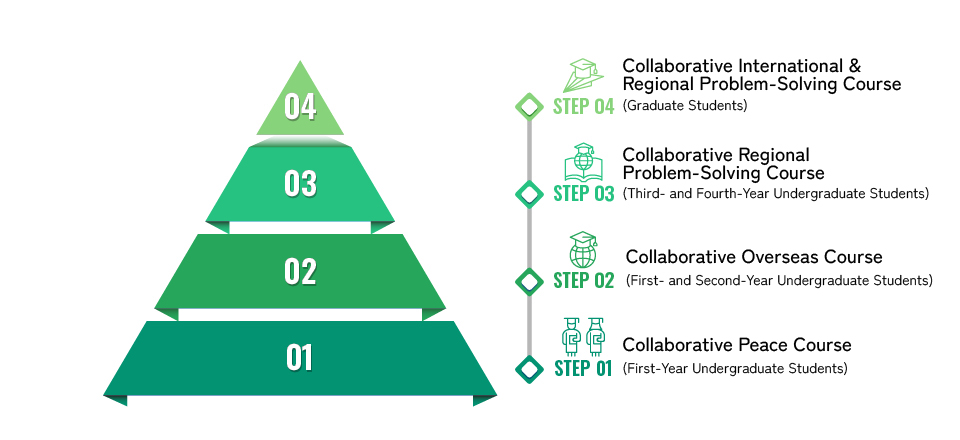Step-Up Educational System for Regional Problem-Solving
This project implements a step-up educational system, designed to empower students to take an active role in solving regional issues. Students progressively deepen their learning through different academic stages while developing practical skills through domestic and international fieldwork and multicultural collaborative learning.

Step 1: Collaborative Peace Course (First-Year Undergraduate Students)
First-year undergraduate students take the “Collaborative Peace Course,” which is a university-wide mandatory subject. In this course, students first engage in online lectures to learn about regional issues. They then participate in small-group fieldwork, which includes international students, to gain firsthand experience with real challenges. The course concludes with group discussions where students propose potential solutions.
Step 2: Collaborative Overseas Course (First- and Second-Year Undergraduate Students)
This course targets first- and second-year undergraduate students, offering an overseas learning experience. Students participate in a study abroad program lasting between 10 days to two weeks, where they examine regional challenges from an international perspective. Collaborating with partner universities abroad, students engage in cross-cultural discussions and fieldwork, further enhancing their understanding of multicultural collaborative learning.
Step 3: Collaborative Regional Problem-Solving Course (Third- and Fourth-Year Undergraduate Students)
For third- and fourth-year undergraduate students, the “Collaborative Regional Problem-Solving Course” (domestic) is introduced. In this course, students work directly with local businesses, government agencies, and community organizations to develop practical solutions to real-world issues. Japanese and international students collaborate through Experiential and Inquiry-Based Learning (EIBL) to apply their academic knowledge to real societal challenges.
Step 4: Collaborative International & Regional Problem-Solving Course (Graduate Students)
Graduate students participate in the “Collaborative International & Regional Problem-Solving Course,” where they tackle regional challenges from a global perspective. In this program, Japanese and international students form collaborative teams, utilizing workshops and fieldwork to apply specialized knowledge in problem-solving.